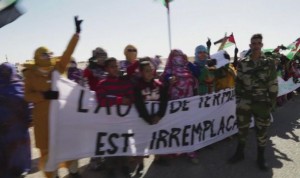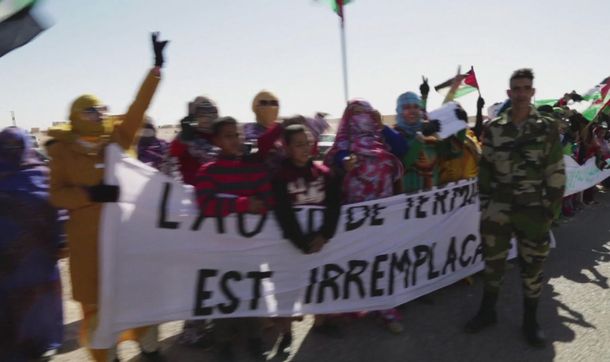ABC NEWS
by Edith M. Lederer, AP

The United Nations said Tuesday it has closed a military liaison office in the disputed Western Sahara after Morocco gave the U.N. observers there 72 hours to leave to protest remarks by U.N. Secretary-General Ban Ki-moon.
It follows Morocco’s expulsion of 84 international civilian staff members with the U.N. peacekeeping mission to protest the U.N. chief’s use of the word “occupation” in describing the status of the vast mineral-rich territory during his first visit earlier this month to refugee camps in Algeria for the Sahrawis, as the region’s native inhabitants are known.
Morocco annexed Western Sahara, a former Spanish colony, in 1975 and fought a local independence movement called the Polisario Front until the U.N. brokered a ceasefire in 1991, which the peacekeeping force has been monitoring.
Morocco considers Western Sahara as its “southern provinces” and has proposed wide-ranging autonomy for the region, but the Polisario Front insists on self-determination through a referendum for the local population — as called for in U.N. resolutions. This hasn’t occurred because of disputes over voter lists.
U.N. deputy spokesman Farhan Haq said the Dakhla liaison office was closed Monday and the three military observers stationed there were relocated to the U.N. site in Awsard, also in territory controlled by Morocco.
The Dakhla office was “the face-to-face counterpart” to the Moroccan army in the local region where many issues including the monitoring of the cease-fire and patrols by the peacekeeping mission were discussed, Haq said, stressing that this now becomes more difficult.
Dakhla is also a military evacuation point and the mission, known as MINURSO, uses the military hospital there when needed, he added.
The United Nations has already informed Morocco that its actions violate the U.N. Charter and military agreements on MINURSO’s operation and it expects to send another reminder on the country’s legal obligations, Haq said.
Secretary-General Ban and Security Council discussed Western Sahara at their monthly lunch on Monday.
“It’s clear that the members of the Security Council appreciate the seriousness of this, and it’s clear that they understand the need to support the work and the mandate of U.N. peacekeeping missions,” Haq said. “We’ve been waiting for some time to see what the united response of the council will be.”
When the Security Council met behind closed doors last Thursday to hear a briefing from U.N. political chief Jeffrey Feltman and discuss Morocco’s actions, no action was taken and diplomats said there were deep divisions among the 15 members.
France, Egypt, Senegal, Spain and Japan supported Morocco, the diplomats said, speaking on condition of anonymity because consultations were private, and the United States announced over the weekend that it backs Morocco’s autonomy plan for Western Sahara.
Haq said Tuesday that if enough time passes, “a lack of a statement can indeed be interpreted as a statement of its very own — and I certainly hope the council members appreciate that that is how it could be perceived.”







